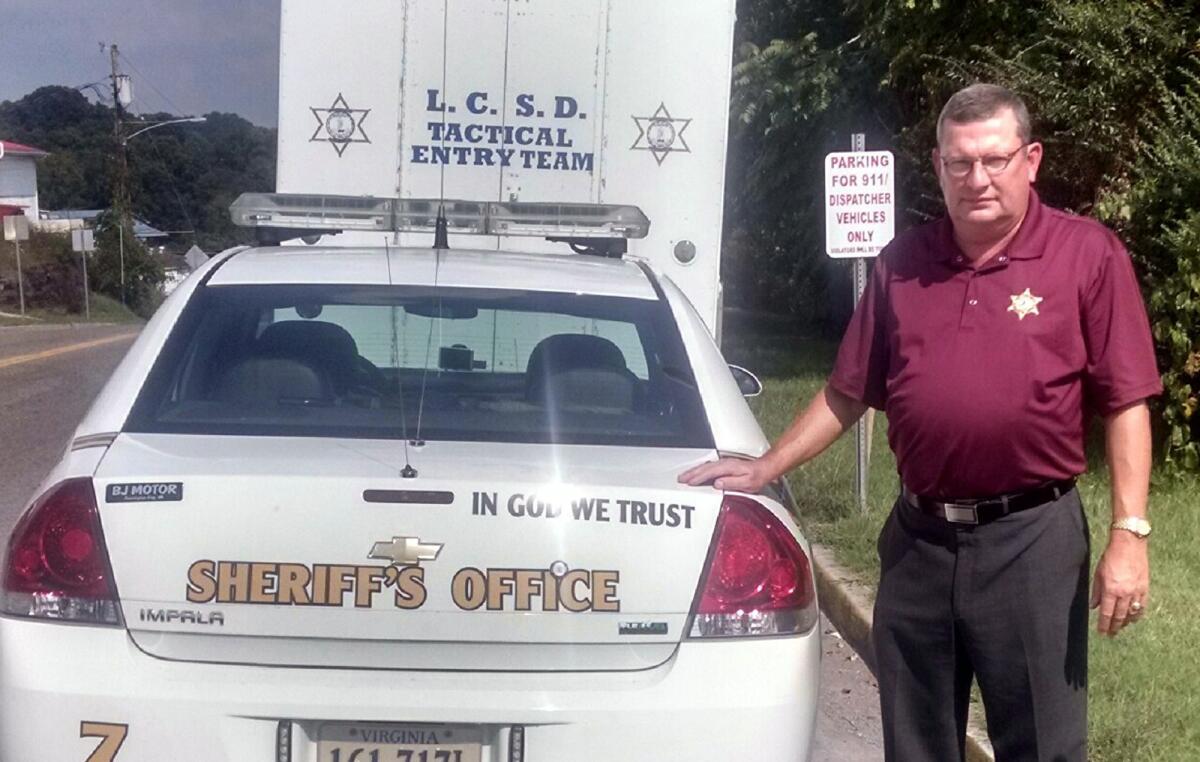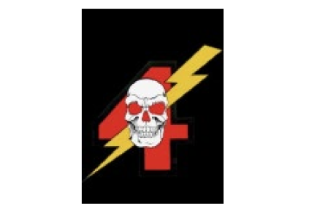Texas police chief tells group what it can do with its demand to dump ‘In God We Trust’ motto

Lee County, Va., Sheriff Gary Parsons stands next to a patrol car that displays an “In God We Trust” decal. Parsons said his office spent a total of $50 to have the decals added to about 25 vehicles.
“Go fly a kite,” wrote Adrian Garcia, police chief of Childress, Texas, to Freedom From Religion, a nontheistic group upset that police pasted “In God We Trust” in capital letters on their patrol vehicles.
“After carefully reading your letter I must deny your request in the removal of our Nations motto from our patrol units, and ask that you and the Freedom From Religion Foundation go fly a kite,” Garcia wrote on a Facebook post.
Invoking God in public and government-funded areas, including police cars, has long sparked the ire of groups such as the foundation, which seeks a separation of church and state.
But the issue has become more urgent in the wake of national criticism over police violence and attacks on officers themselves.
Last month, after Harris County Deputy Sheriff Darren Goforth was shot 15 times and died in an ambush at a gasoline station in suburban Houston, the Childress Police Department added the “In God We Trust” decal to its cars.
Childress followed dozens of other departments in at least five states -- Texas, Arkansas, Florida, Kentucky and Virginia -- that have recently moved to prominently display the slogan.
The department’s rejection was not a surprise to the leader of Freedom From Religion, Annie Laurie Gaylor. The foundation, which has 23,000 members, has sent more than 50 letters complaining about the motto to officials.
“We have had a few success, like when it was suggested the motto go up in city chambers,” Gaylor told the Los Angeles Times on Tuesday. However, police departments have generally rejected the foundation’s argument that the separation of church and state is being violated by the slogan.
The motto-movement among some police departments comes at a time when police violence against African Americans has been at the forefront of national debate and has ignited civil unrest after a series of deadly police encounters, including in Ferguson, Mo., Baltimore and New York.
“I think there is no question that police and sheriff’s departments are wrapping themselves in the mantle of piety,” Gaylor said. “Police are feeling criticized so they react to this criticism by sticking God on their cars. Monkey see and monkey do all over the country; it is so anti-intellectual imagining that God will protect them.”
Childress County has about 7,000 people and is slightly less than 500 miles from where Goforth was slain. After the shooting, Garcia took to the department Facebook page on Sept. 2 and posted a picture of a patrol unit with a new decal of the motto.
NEWSLETTER: Get the day’s top headlines from Times Editor Davan Maharaj >>
“Please excuse the dirty unit. I had to share this with the public. Notice what I will be putting on all Childress Police patrol units,” he said.
“I think with all the assaults happening on officers across the country ... it’s time we get back to where we once were,” Garcia said in an interview with the Red River Sun in early September. The police chief was not immediately available on Tuesday, according to his office.
‘“In God We Trust,” is the national motto and appears on U.S. currency.
Gaylor dismissed it as a “johnny-come-lately” adage that achieved its current status during the Cold War when the United States was seeking to define itself as something in opposition to the official atheism of the Soviet Union.
The motto first appeared on U.S. coins in 1864, became the official motto in 1956, and was added to paper money the following year. In 2006, the Senate reaffirmed its status as the official motto and the House of Representatives in 2011 passed another resolution backing the motto.
The unofficial national motto was E pluribus unum (out of many, one), dating from the 18th century and appears on the Great Seal.
Follow @LATmuskal on Twitter.
ALSO
What’s the Plan B if you get deported? A generational divide
Planned Parenthood chief goes head-to-head with GOP in emotional hearing
Woman is freed from locked shed in Lancaster after year of torture, officials say
More to Read
Sign up for Essential California
The most important California stories and recommendations in your inbox every morning.
You may occasionally receive promotional content from the Los Angeles Times.











